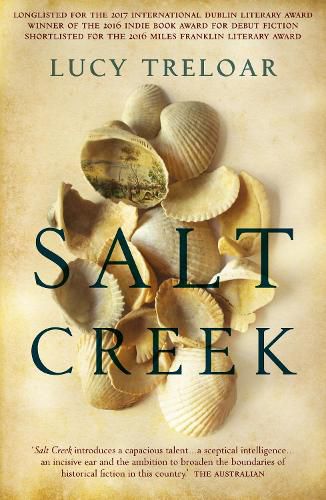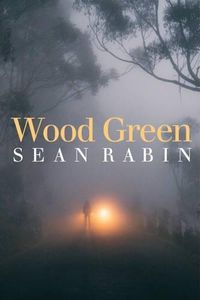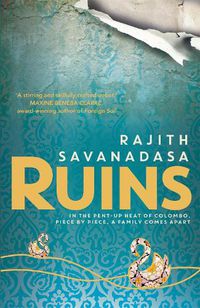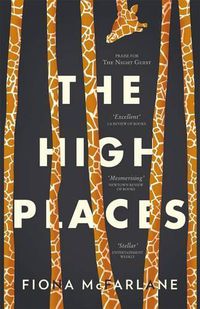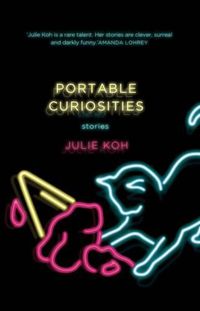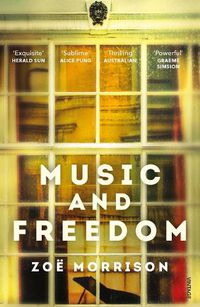Read an extract from Salt Creek by Lucy Treloar
We’re delighted that Salt Creek by Lucy Treloar is one of the six books shortlisted for this year’s Readings Prize for New Australian Fiction. Here is a short extract from the novel.
Find more information about this year’s shortlisted books (including the judges’ report) here.
The journey to that place was like moving knowingly, dutifully, towards death. I have seen beasts as resigned. People say it is not so, that they are ignorant to the end, but this is only what people hope. I knew our purpose in travelling there, how Papa had pinned his last tattered dreams to it, which I imagined visible as a flag slipping listless above the dray. Although Mama was as sad as I ever saw her, yet we knew or thought that our all, our very lives and futures, depended on Papa. It was unthinkable not to go with him.
Two days by horse and cart to Wellington, the river crossing, and three more days on a dray had brought us to the edge of our new prop-erty – our home, if such it could be called – the bullocks blowing and slobbering at each plodding step. It must be familiar to Papa and Hugh and Stanton. They had hardly finished taking the cows down the stock route to Salt Creek before they had to return to Adelaide to collect us. I did not believe any crop could grow on it or any livestock thrive. Everywhere were rolling grey shrubs and here and there a tree grown slantwise in the wind, I supposed, though it was still enough that day. If the land was an ill-patterned plate, the sky was a vast bowl that curved to meet the ground a very great distance from us in any direction we cared to look. There was no going beyond its rim.
Hugh and Stanton rode ahead and Papa drove the bullocks. The way was so worn down that its edges were a foot up the sides of the dray in places. Sandy soil spilled onto the dry old churnings of hooves and wheels. The route spread wide elsewhere, its centre as uncertain as an inland sea, and Papa had to stand in his seat to see where we should go: empty now. Prospectors and the gold escort had come this way once, but the inland track had stopped that, Papa said. A person might think, to hear him, that such scarcity of life was a virtue.
I was in the dray with Addie and Mama and Albert and Fred and the new babe, Mary, who was fretting. Her white fists waved about and battered at Mama’s breast. Hungry again. Mama unbuttoned herself and obliged. I looked away, not that there was very much to see about us, but it was preferable to Mama’s sad face. Grandmama and Grandpapa and dear friends left behind for Papa’s newest venture.
When news came that the ship carrying the fine fat sheep that Papa had purchased had gone down off the coast of Van Diemen’s Land, Papa had paced the drawing room, backwards and forwards across the window, tall and straight as he moved from shadow into light and back again.
Mama, hovering in the middle of the rug, said, ‘You will come about. You will. You have us safe.’
Papa looked at her. His deep set eyes were rather empty. ‘Yes,’ he said absently, when she approached him, and patted her arm.
‘It might be a blessing. Who would oversee the flock? Everyone has left for the goldfields. You could not do more.’
It was true. For the last several years Papa had often been away at the dairy farm in Willunga, taking Hugh and Stanton with him. The house was quiet in their absence, which we did not like, though Mama said it had been worse in the whaling station days when a month or more would pass before he could come back to us from Encounter Bay. Of course, we had two maids then, and a cook, so it would not have been very hard on Mama despite there being four of us already and her soon to have Addie. He had made a loss on the whaling station, whales not being as plentiful as they had been, which was a bitter pill. He had been obliged to sell most of his subdivisions in Adelaide to cover costs. At least the dairy had prospered. As Grandmama said one day: ‘If only he had been content with that.’ He borrowed against it to buy sheep, and then it seemed that everything began to go wrong, and this time there was nothing to fall back on. The bank foreclosed on the farm and finally the house in Adelaide must be sold. At least Papa had kept the stock, and before collecting us from Adelaide had driven them through the hills and down the stock route to Salt Creek.
Now, Addie hung over the back of the wagon, holding a stick against the dust to make a trail. It was not safe and a girl of eleven was too old for such childish games, but if Mama did not bestir herself to say some-thing, I saw no reason why I should. Albert and Fred began to squabble over a grasshopper that had jumped into the dray. Albert wished to tie thread about one of its legs and keep it as a pet and train it to do I know not what, while Fred wished to examine it.
‘Give it back, Al. It set on me,’ Fred said, and after a jostling wrested it back and held it in his cupped hands. A grasshopper claw protruded between his fingers, pushing at the air. It would be warm and sweaty in there, with a strong odour of boy, and not very comfortable.
‘Hester,’ Mama said to me wearily. Once she would have put the crea-ture into a jar that we might observe it, the spring in its muscular legs, the joints, its bulging eyes. It would have been an opportunity for learning. ‘See, it has its bones on the outside, while we have our bones on the inside,’ I imagined her saying, and since she didn’t, I did. Fred and Albert glanced from me to Mama, who remained silent. I wished Mama would take herself in hand. They were growing disobedient. Fred wouldn’t be a boy for much longer; he was growing fast. It made poor Albert appear even younger. Fred was beginning to draw away from him in his interests. It took the quickness of a grasshopper to bring them together again.
I would have given anything to ride ahead with the boys. Stanton was only a little older than me, and Hugh was a clumsy rider. He had laughed and teased at his first sight of me on the bullock dray. ‘Look at Miss Hester in her fine carriage.’
His self-satisfaction made me boil up inside. I sat straight, and held my hands in my lap and looked down my nose at him. ‘Where you should be, Hugh. Away from those reins. Look at poor Birdie. You’ll ruin her mouth.’
He jabbed the reins, sending Birdie shuffling and dancing. His moods travelled down the leather and he did not know the way of stopping it. He was missing an audience for his opinions and his amuse-ments afresh, I daresay, having spent part of winter and most of spring on the Coorong with Papa and Stanton building the house, and was no happier than I at the turn our lives had taken.
‘It will be five years and more before you go back to town, if it’s as soon as that,’ he said. ‘What use will your fine gloves be until then?’
‘I will, I tell you. I’ll be back before you,’ I said, though I knew it was not true, for how could I, a girl, hope to escape? I felt very wretched when people talked like that, but it wouldn’t be my fault if I were not in town before then; I had made up my mind to that before we left.
Now I looked down at Fred, so like Addie, with his dark hair and pale skin. ‘Show me,’ I said.
He opened a well into his hands between thumb and forefinger. I looked, but it was so bright outside his hand, where we were, that I could not see in. At a lurch into a pothole we threw out our hands to brace – Fred too – and the grasshopper, a brown flecked bullet, made good its escape over the side. ‘Oh,’ we all said, for a moment united in loss. Any amusement, even one as slight as this, had been welcome.
Hearing the commotion, Addie pulled her stick in and scrambled down the dray, her knees and boots tangling in her petticoats. ‘What? What is it?’ in her little hoarse voice. She was our English rose, so Papa said. Grandmama said different. She said Addie was the apple of Papa’s eye. I supposed that if she were an apple or a rose I was a bramble. It was ridiculous how fast I grew; on that there was general agreement. My dresses were always too short. The boys would tease, and nothing that Mama and Papa said stopped them.
In Adelaide Mama had tugged at my skirts as if she could make the fabric stretch. I was forever having fittings until the money ran short. After that Mama would look at me, her eyes fixing on the expanding gap between hem and floor. ‘It will have to do until you are finished growing.’
‘Or the sheep stop drowning,’ Stanton said, sitting on the edge of the kitchen table, his hands in his pockets, and swinging his legs.
Mama frowned. ‘Stanton, I believe you are needed elsewhere.’ He lifted his brow, smoothly jumped from the table and sauntered out, his hands still in his pockets, as if it were his own choice rather than Mama’s request that had made him leave. The girls went wild for Stanton, with his ruddy curls and hazel eyes and dandified clothes – flowered waistcoats and the like. He was like a hot cat blinking in the sun. They would all like to pet him.
Mama returned her gaze to the problem at hand, which was me. ‘If you bend a little it will not appear so bad.’ Since I must also stand straight it was quite confusing. Once I heard her say to Papa, ‘She’s fifteen. Where will it end? Surely soon, else no one will want her.’
Strange to say, I would prefer it if she were saying such things again, though I did not like it then. Since the little ones died she has cared for nothing. First Louisa, not one year old, after Papa had lanced her gums to ease her teething. Then dear Georgie. The flux and a hot spell had been enough to take him away. He was the dearest little fellow.
We had all been sad since, and Addie fearful that she might fall ill again. For a few days it had seemed we might lose her too. She put her hand to her forehead often. ‘Feel me, Hester,’ she said. ‘Am I hot?’ I could not reassure her, only distract. In quiet moments when I found a place to be alone I sometimes touched my own forehead and cheeks and pressed against them a handkerchief sprinkled with a little of Mama’s rose water to cool myself, and wondered. I did not wish to die.
Now, Addie shook my shoulder. ‘Hester, tell me.’
‘Just a grasshopper, Addie. Gone now.’
‘Oh.’ Her mouth was round with disappointment. She scraped her hair from her face.
‘Where’s your ribbon?’ I asked.
She looked about at the parcels and trunks. Her eyes lifted to the broken way behind us. She shrugged.
‘Never mind,’ I said. ‘There will be something in Mama’s workbasket that will make you nice again.’ Really she was old enough to manage on her own, but we had fallen into the way of babying her while she was ill.
She scrambled over our possessions to retrieve the basket and returned. I found a piece of cherry thread and combed my fingers through her hair and made a plait, binding its end with the red thread. Addie tried to pull it around so she could see it, but her hair had been cut short when she had the fever and had not grown again.
The dray continued its abominable lurching. We were on our run, but it made no difference to anything. We were here, not home. The journey was not flight; it was scarcely movement. I conceived of travel as sleek as water, not this dull connection with the ground and the wheels with a seeming will to plough deeper into it. I wanted to go and go and never stay still and have no one tell me what to do now or tomorrow or ever.



